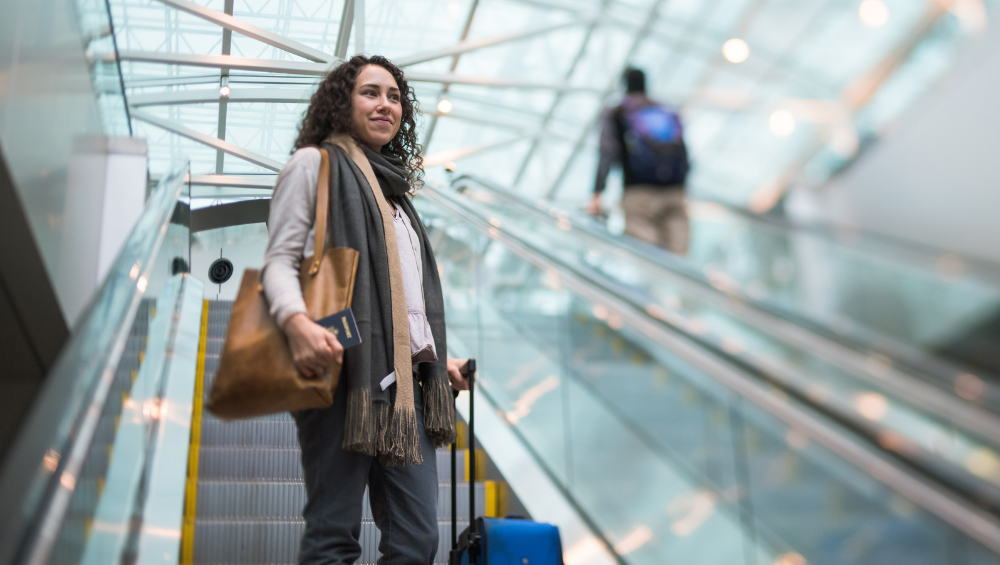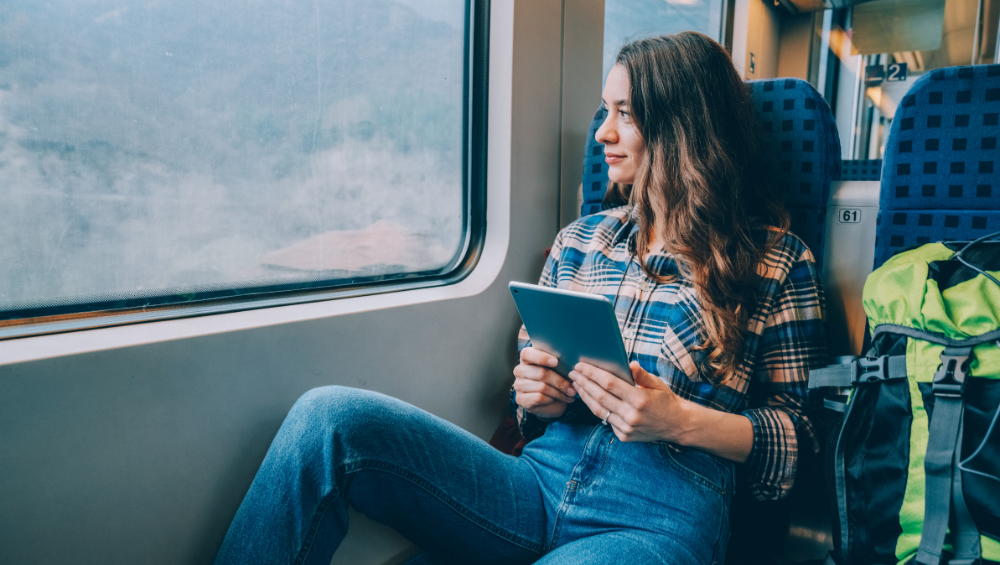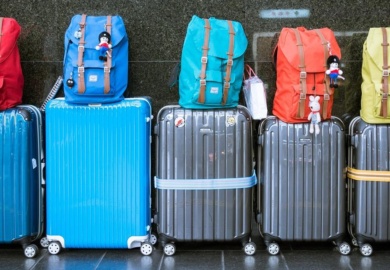Table of Contents
One of our women readers’ most frequently asked questions is about the possibilities and experiences of traveling solo. Many express concerns about relationships, safety, loneliness, and the logistics of embarking alone. These are all valid apprehensions, but countless women have found solo travel to be an empowering and deeply enriching experience. Let’s explore the ins and outs of wandering the world alone to help you feel more confident and excited about taking that leap into solo adventures.
In recent years, solo travel has significantly increased, with more individuals exploring the world on their own terms. A study by Booking.com revealed that 40% of global travelers have taken a solo trip in the past year, highlighting a growing trend.
As someone passionate about experiencing new places and cultures, it’s disheartening when those close to you don’t share the same enthusiasm for travel. However, if someone in your life does not want to travel with you, you should travel without them.
Why Solo Travel is Important
Embarking on a solo journey can feel intimidating, especially when your family and friends are not keen on the idea. It’s natural to crave companionship, to share experiences, and to create memories together. However, solo travel is an enriching and empowering experience that allows you to forge your own path and grow in ways you might not have imagined. It teaches self-reliance, builds confidence, and allows spontaneous choices without considering another’s preferences.
While it may be difficult to travel alone, especially when those closest to you are reluctant or concerned, it’s an opportunity to prioritize your own passions and dreams. Remember, traveling solo doesn’t mean you’re alone; it means you’re open to meeting new people and discovering unexplored facets of the world and yourself.
Desire to Travel Solo
Personal Fulfillment
Traveling offers unparalleled opportunities for personal growth and fulfillment. It takes you out of your comfort zone and exposes you to new ways of life, fostering a deeper understanding of yourself and others. Each trip becomes a chapter in your personal story, filled with discoveries and experiences that shape who you are.
Broadened Horizons
One of the most rewarding aspects of travel is how it broadens your horizons. By immersing yourself in different cultures, you gain perspectives that would be impossible to attain otherwise. These experiences enrich your life, making you more empathetic and open-minded.
Health Benefits
The health benefits of travel cannot be overstated. From reducing stress to boosting creativity, taking a break from your routine rejuvenates your mind and body. Studies have shown that travel can lower the risk of heart disease, improve brain health, and even increase longevity.
Understanding Reluctant Travelers
It’s common to encounter friends or family members who are hesitant about traveling. Their reluctance can stem from various reasons, from financial concerns to fear of the unknown. Understanding these factors is essential to respect their preferences while pursuing your passion for travel. Recognizing everyone has different comfort zones and priorities can help maintain harmony in your relationships. It also encourages open and empathetic discussions, making conveying why solo travel is important to you easier.
Common Reasons for Reluctance
It’s important to understand why some people are reluctant to travel. Common reasons include fear of the unknown, financial concerns, and a strong preference for routine. These are valid concerns that deserve acknowledgment.
Respecting Their Choices
While it can be frustrating, respecting the choices of those who prefer not to travel is crucial. Everyone has different comfort levels and interests, and it’s important to honor their preferences just as you would want yours to be respected.

Solo Travel with Unwilling Companions
Traveling with companions who are reluctant or uninterested can significantly affect your travel experience. It often results in compromise, leading to a less fulfilling journey for both parties. When your travel partner isn’t as enthusiastic or open to new experiences, it can create tension and limit the spontaneity and discovery that make traveling enjoyable. By understanding these dynamics, you can make more informed decisions about your travel arrangements and ensure that your adventures remain a source of joy and personal growth.
Negative Energy
Traveling with a reluctant partner can significantly affect the overall experience. Their negative energy can dampen the excitement and joy that travel brings, turning what should be an adventure into a chore. This can lead to frustration and resentment, ultimately damaging the relationship.
Compromises and Limitations
When traveling with someone uninterested, you often have to make compromises that can limit your experiences. Whether it’s skipping activities you were excited about or adjusting to their comfort levels, these limitations can diminish the trip’s potential.
Conflict and Stress
Traveling with unwilling companions can lead to conflict and increased stress. Differing expectations and priorities can create tension, making what should be a relaxing and enjoyable time fraught with disagreements.
Embracing Solo Travel
When you embrace solo travel, you open the door to countless opportunities for self-discovery and adventure. It’s a chance to march to the beat of your own drum, making decisions that cater entirely to your interests and needs. Whether choosing a destination that’s been on your bucket list for years, indulging in local cuisines without worrying about others’ diets, or spending an entire afternoon meandering through a museum, solo travel allows you to create an itinerary that’s uniquely yours.
Building Confidence
Traveling alone builds confidence that is hard to achieve in any other way. The sense of accomplishment you gain from navigating a foreign city, handling travel logistics, and overcoming any obstacles that come your way is incredibly empowering. This newfound confidence often spills over into other areas of your life, making you more self-assured and decisive in your everyday endeavors.
Meeting New People
Solo travel doesn’t mean you’ll be lonely. In fact, traveling alone often makes you more approachable, encouraging local residents and fellow travelers to strike up conversations. You are more likely to meet new people and form meaningful connections. These encounters can lead to new friendships and sometimes even lifelong bonds, enriching your experience beyond the trip.
Flexibility and Spontaneity
One of the greatest joys of traveling solo is the flexibility it affords. You can make spontaneous decisions that enhance your travel experience without considering anyone else’s schedule or preferences. Whether it’s taking a detour to a quaint, hidden village or extending your stay in a city you’ve fallen in love with, solo travel lets you seize every moment without constraints.
Overcoming Fears
Traveling alone can help you confront and overcome personal fears. Whether it’s the fear of flying, the anxiety of being in an unfamiliar place, or the challenge of navigating language barriers, each trip builds resilience. Embracing these challenges head-on makes you a more seasoned traveler and a stronger individual.
Independence and Freedom
Solo travel offers unparalleled independence and freedom. You can follow your own schedule, make spontaneous decisions, and focus entirely on what you want to experience. This level of autonomy is incredibly liberating.
Personal Growth
Traveling alone provides ample opportunities for self-discovery and personal growth. Navigating new environments builds confidence and resilience, which extend beyond travel into everyday life.
Relationships & Solo Travel
Balancing your love for travel with maintaining healthy relationships can be a delicate dance. While solo adventures offer freedom and self-discovery, it’s important to ensure that your personal passions do not strain your connections with loved ones. Understanding and respecting your partner’s or family’s feelings toward travel while finding ways to incorporate your own desires can create a harmonious balance. Open communication and empathy are key to navigating this terrain, allowing your relationships and love for travel to thrive.
Communication
Open and honest communication about your travel desires is essential. Expressing why travel is important to you can help your loved ones understand your perspective and foster mutual respect.
Setting Boundaries
Setting boundaries and understanding that it’s okay to travel without your loved ones is crucial. Pursuing your interests doesn’t mean neglecting your relationships; it means nurturing your growth, ultimately benefiting everyone.
Encouraging Their Interests
Encouraging reluctant travelers to pursue their own interests while you pursue yours creates a balance. This approach allows both parties to feel valued and understood, maintaining harmony in the relationship.

The Pain of Solo Travel
Traveling alone isn’t always a bed of roses; it comes with challenges and difficulties that can sometimes make the experience daunting. From the loneliness that may creep in during quiet moments to the financial burden of not having someone to share costs with, solo travel can test your resilience and resourcefulness. Understanding these potential pain points before embarking on a solo journey can help you better prepare and develop strategies to ensure a rewarding experience despite the hurdles.
Strengthening Relationships
Travel can indeed strengthen relationships through shared experiences and memories. However, forcing someone to be unwilling can have the opposite effect, creating tension rather than bonding. Instead, focus on finding common ground and shared interests in other aspects of life.
Safety Concerns
Solo travel safety concerns are valid when traveling alone. However, with proper planning and precautions, solo travel can be safe and rewarding. Research solo travel destinations thoroughly, stay connected with loved ones, and always be aware of your surroundings.
Financial Considerations
Traveling with others can help reduce costs through shared expenses. But solo travel doesn’t have to be prohibitively expensive. Budget travel options like hostels and local food can make solo adventures more affordable.
Emotional Support
While traveling alone might lead to feelings of loneliness or homesickness, it also offers a chance to build inner strength. Embracing these feelings can lead to personal growth and a deeper understanding of oneself.
Misunderstanding Reluctance
It is important to recognize that someone’s reluctance to travel might be temporary or based on a lack of experience. Encourage them to try a short trip or join you in a destination that aligns with their interests, and they might discover a newfound love for travel.
Potential for Conflict
Traveling without a partner or close friend might lead to feelings of abandonment or resentment. Address these feelings openly and reassure them of your commitment to the relationship. It’s possible to pursue your passions while maintaining strong, healthy relationships.
Tips for Getting Started with Solo Travel
Embarking on your first solo travel adventure can be both exciting and daunting. To help you get started, here are some practical tips:
1. Start Small
Begin with shorter trips or weekend getaways to nearby solo travel destinations. This allows you to ease into solo travel and build confidence. As you become more comfortable, you can take longer trips to distant locations.
2. Plan Ahead
Thorough planning is essential for solo travel. Research your destination, book accommodations in advance, and have a basic daily itinerary. This will provide structure and peace of mind while still allowing for spontaneity.
3. Connect with Other Solo Travelers
Join online communities or attend meetups for solo travelers to connect with others and gain valuable tips and insights from experienced individuals.
4. Pack Light
Traveling light makes it easier to move around and manage your belongings. Opt for versatile clothing and essentials, leaving room for any souvenirs you might pick up.
5. Stay Connected
Keep in touch with family and friends. Share your travel itinerary, check in regularly, and use social media to update them on your journey.
6. Learn Basic Phrases
Learning key phrases in the local language can go a long way. It shows respect for the local culture and can help in navigating everyday situations.
7. Stay in Social Accommodations
Consider staying in hostels, guesthouses, or other social accommodations where you can easily meet fellow travelers and locals.
8. Trust Your Instincts
Always listen to your gut feelings. If a situation feels off, remove yourself from it. Prioritize your safety above all else.
9. Have a Backup Plan
Unexpected things can happen. Keep copies of essential documents and have a backup plan in case your original itinerary gets disrupted.
10. Travel Insurance
Invest in travel insurance to cover unforeseen events such as medical emergencies, trip cancellations, or lost belongings. It’s better to be safe than sorry.
Traveling Solo
Traveling is more than just visiting new places; it’s a journey of self-discovery and personal growth. If someone in your life is unwilling to travel, don’t let that hold you back. Embrace the opportunity to explore the world on your terms.
Traveling solo offers independence, freedom, and the chance to meet new people and gain valuable insights. It’s an enriching experience that can enhance your life in countless ways.
So, take the plunge. Book that ticket, pack your bags, and set off on an adventure that awaits. Your journey is the destination, and the experiences you gather will shape you into a more fulfilled and well-rounded individual.
FAQs
Is solo travel safe?
Yes, traveling solo can be safe if you take proper precautions. Research your destination thoroughly, stay aware of your surroundings, and keep in regular contact with friends or family. Trust your instincts and avoid risky situations to ensure a secure trip.
How can I manage loneliness while traveling solo?
Stay connected with loved ones through phone calls or social media to manage loneliness. Engage in group activities or tours to meet fellow travelers, and consider staying in hostels or shared accommodations where you can interact with others.
How do I budget for solo travel?
Budgeting for a solo trip involves planning and being mindful of expenses. Look for affordable accommodations like hostels or guesthouses, eat at local restaurants, and use public transportation. Also, travel during off-peak seasons for cheaper rates.
What are the best destinations for solo travel?
Some destinations are particularly known for being solo travel-friendly due to their safety, accessibility, and welcoming nature. Examples include Japan, New Zealand, Iceland, and Portugal. You should choose a destination that aligns with your interests and comfort level.
How do I handle emergencies when traveling solo?
Preparation is key to handling emergencies. Have copies of important documents, know the location of your country’s embassy, and have a list of emergency contacts. Familiarize yourself with local emergency numbers and consider getting travel insurance for added protection. Knowing where the embassy or consulate is in your location is vital.



